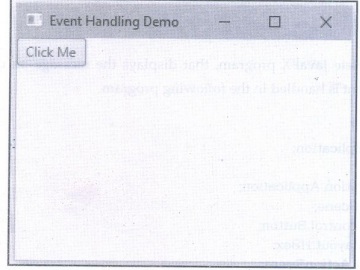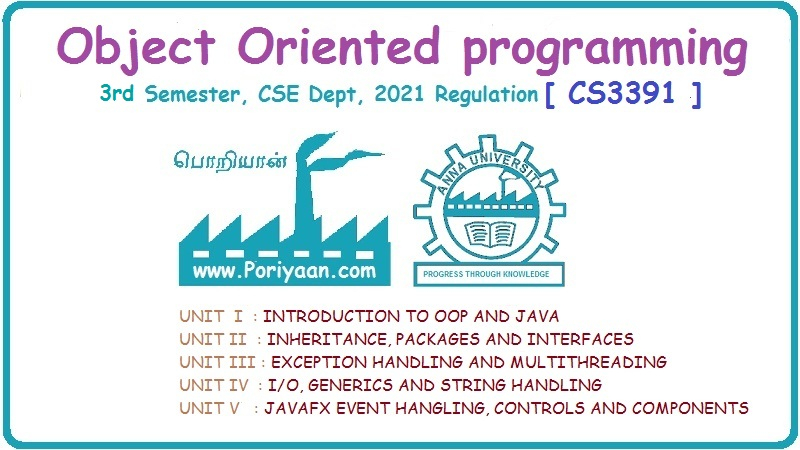Object Oriented Programming: Unit V: JAVAFX Event Handling, Controls and Components
JAVAFX Event Basics
Syntax with Example Java Programs
Event means any activity that interrupts the current ongoing activity. For example: when user clicks button then it generates an event. To respond to button click we need to write the code to process the button clicking action.
Event Basics
• Event
means any activity that interrupts the current ongoing activity. For example:
when user clicks button then it generates an event. To respond to button click
we need to write the code to process the button clicking action.
• Event Source Object : The object that
generates the event is called event source object. For example- if the event
gets generated on clicking the button, then button is the event source object.
• Event Handler: The event handling code written to process the generated
event is called event handler.
• Event Listener: The task of handling an event is carried out by event
listener. When an event occurs, first of all an event object of the appropriate
type is created. This object is then passed to a Listener. A listener must
implement the interface that has the method for event handling.

Registering Handlers and Handling Events
• JavaFX has just one interface for all kinds
of Event Handlers.
• It is
an instance of the EventHandler<T extends Event> interface. This
interface defines the common behavior for all handlers. <T extends Event>
denotes that T is a generic type that is a subtype of Event.
• The
EventHandler object handler must be registered with the event source object
using the method source.setOnAction(handler).
• The
EventHandler<ActionEvent> interface contains the handle(ActionEvent)
method for abc processing the action event. We have to write the handler class
that must override this method to respond to the event. Hence we must import
javafx.event.EventHandler class in our application program.
• The
event Class hierarchy is as shown below -

• There
are user actions that are associated with some source objects. For these
actions particular event is fired. The JavaFX associate some setOnXXX methods
for registering these events. The list of such user actions, source objects and
setOnXXX methods are enlisted in the following table.

• Java
makes use of delegation based model for event handling and registration. This
model is as shown below.
The
event handling process is a two step process. It performs following
functionalities –
(1) The handler object is an instance of
appropriate EventHandler interface. The EventHandler interface is defined as
EventHandler<T extends Event>. It contains handle() function for
processing the event.
(2) The
handler object is registered by the source object. The registration methods
depend on the event type. For ActionEvent, the method is setOnAction. For a
mouse pressed event, the method is setOnMousePressed. For a key pressed event,
the method is setOnKeyPressed.
For
example
Button
button = new Button("Click Me");
//Event
object is button
button.setOnAction(new
EventHandler <ActionEvent>() //Event registration
{
public
void handle (ActionEvent event)
………
……...
}
Following
is a complete JavaFX program, that displays the message on clicking the button.
Thus button click event is handled in the following program.
Programming Example
package
myjavafxapplication;
import
javafx.application.Application;
import
javafx.scene.Scene;
import
javafx.scene.control.Button;
import
javafx.scene.layout.HBox;
import javafx.event.ActionEvent;
import javafx.event.EventHandler;
import
javafx. stage. Stage;
public
class MyJavaFXApplication extends Application {
@Override
public
void start(Stage primaryStage) {
HBox
root = new HBox();
Button
button = new Button("Click Me");
button.setOnAction(new
EventHandler <ActionEvent>()
{
public
void handle (ActionEvent event)
{
System.out.println("Button
is clicked!!");
}
}
};
root.getChildren().add(button);
Scene
scene = new Scene(root,300,200);
primaryStage.setScene(scene);
primaryStage.setTitle("Event
Handling Demo");
primaryStage.show();
}
public
static void main(String[] args) {
launch(args);
}
}
Output

On clicking the above button, we get following message in the output window

Object Oriented Programming: Unit V: JAVAFX Event Handling, Controls and Components : Tag: : Syntax with Example Java Programs - JAVAFX Event Basics
Related Topics
Related Subjects
Object Oriented Programming
CS3391 3rd Semester CSE Dept | 2021 Regulation | 3rd Semester CSE Dept 2021 Regulation
